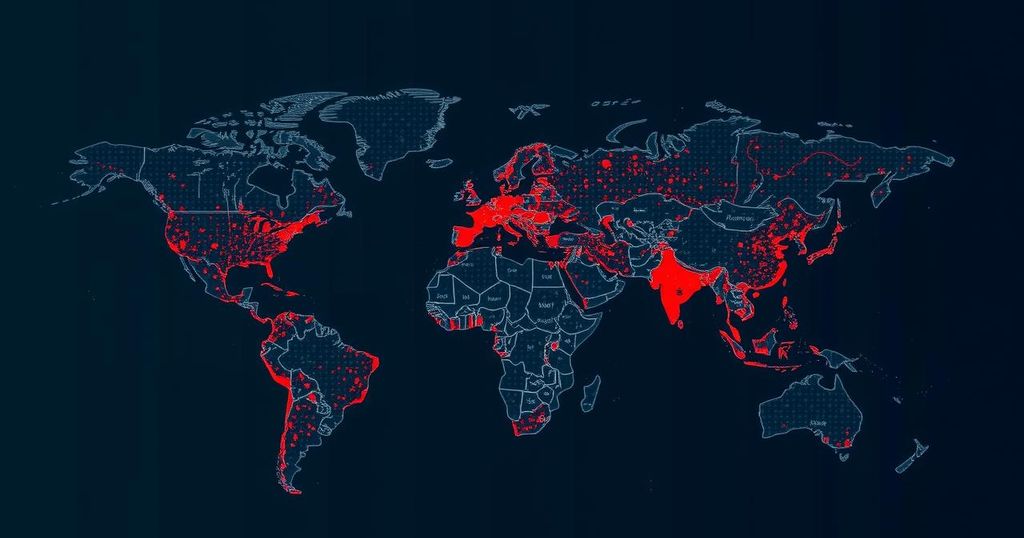Experts from the Freeman Spogli Institute discussed various global threats, including climate change, democratic backsliding, competition with China, the war in Ukraine, and Middle Eastern conflicts. They emphasized the need for awareness and collaborative strategies to tackle these interconnected challenges.
The contemporary global landscape is fraught with numerous intertwined threats, including climate change, the deterioration of democratic values, heightened tensions with China, ongoing warfare in Europe, and escalating conflicts in the Middle East. These issues were the focus of a recent panel discussion titled “Global Threats Today: What’s At Stake and What We Can Do About It,” organized by the Freeman Spogli Institute for International Studies (FSI) at Stanford University. Scholars from FSI elaborated on the evolving nature of these challenges and articulated strategies for addressing them. Moderated by FSI Director Michael McFaul, the panel featured scholars including Marshall Burke, Didi Kuo, Amichai Magen, Oriana Skylar Mastro, and Steven Pifer. Each scholar discussed critical topics, urging a deeper public understanding of significant issues such as climate change, the war in Ukraine driven by Russian aggression, China’s international ambitions, the precarious state of American democracy, and the implications of the ongoing conflict between Israel and Hamas in the broader context of global governance. Amichai Magen highlighted the emergence of a new international coalition—referred to as the “axis of misery”—comprising Russia, Iran, and North Korea, supported by China. This coalition is undermining the liberal international order that has previously enabled stability and progress. Magen warned of the dangers posed by this shifting power dynamic, emphasizing that the continued existence of states like Ukraine, Israel, and Taiwan is under threat. He called for a renewed strategic vision that promotes cooperation in the Middle East, especially concerning a two-state solution that respects both Israeli and Palestinian aspirations. Didi Kuo pointed out that threats to democracy are often rooted in internal dynamics rather than external pressures. She provided examples of nations such as France, Brazil, and Poland where democratic coalitions have successfully resisted authoritarian tendencies. Kuo stressed the importance of adaptive and flexible political frameworks to counteract the rise of illiberalism from within democratic institutions. Steven Pifer addressed the narrative of inevitable Ukrainian defeat in the ongoing war against Russia. He asserted that despite facing significant losses, Ukraine remains resolute and existentially committed to its victory. Pifer argued for enhanced support for Ukraine to secure a stable Europe and warned that a victorious Putin could pose a more significant threat to European security. Oriana Skylar Mastro elaborated on the resilience of China as a global power. Despite its economic slowdown and demographic changes, Mastro cautioned that China’s influence is not diminishing and outlined the necessity for a comprehensive U.S. strategy to maintain balance in the Asia-Pacific region. Marshall Burke acknowledged progress on climate change, with emissions decreasing by 20% since 2005, largely due to U.S. policy initiatives. However, he cautioned that globally, emissions remain relatively stagnant and called for substantial efforts in both mitigation and adaptation to face the realities of climate change. In summary, the panel of experts stressed the necessity of understanding and addressing the multitude of threats facing the world today. Whether through fortifying democratic practices, reassessing international power dynamics, or confronting climate change with urgency, collaborative efforts and strategic reforms are essential to navigate these pivotal challenges effectively.
The discussion at the Freeman Spogli Institute for International Studies revolved around urgent global issues that intertwine and affect international relations, security, and democracy. The scholars provided insights based on their expertise and research, shedding light on both the challenges and potential solutions to these pressing concerns. The panel emphasized the importance of public awareness and informed discourse surrounding these topics, which are increasingly relevant in today’s geopolitical landscape.
The panel discussion at the Freeman Spogli Institute underscored the interconnected nature of 21st-century global threats. It is crucial for policymakers and the public to acknowledge both internal and external challenges to democracy, the resilience of authoritarian coalitions, the ongoing struggles in Ukraine, and the persistent significance of climate change. Collaborative international strategies and robust support mechanisms are vital for addressing these issues meaningfully and effectively.
Original Source: fsi.stanford.edu






